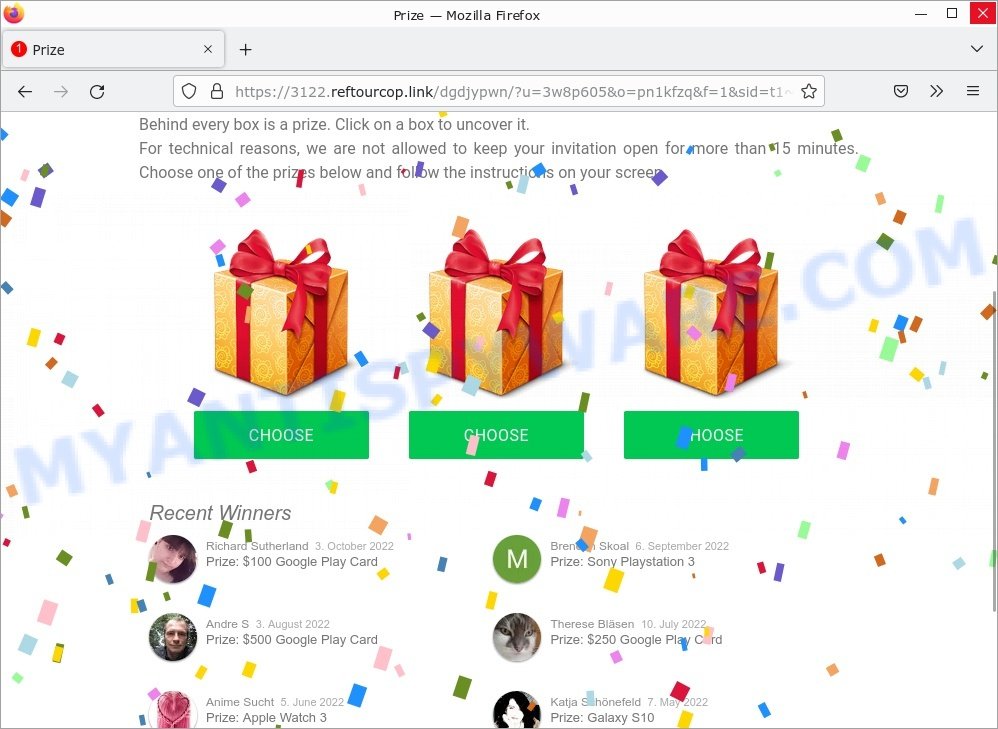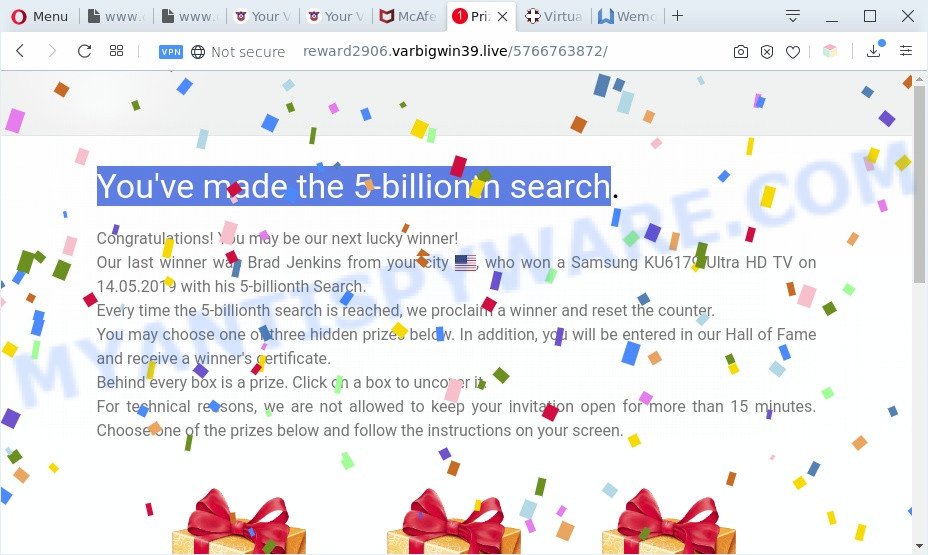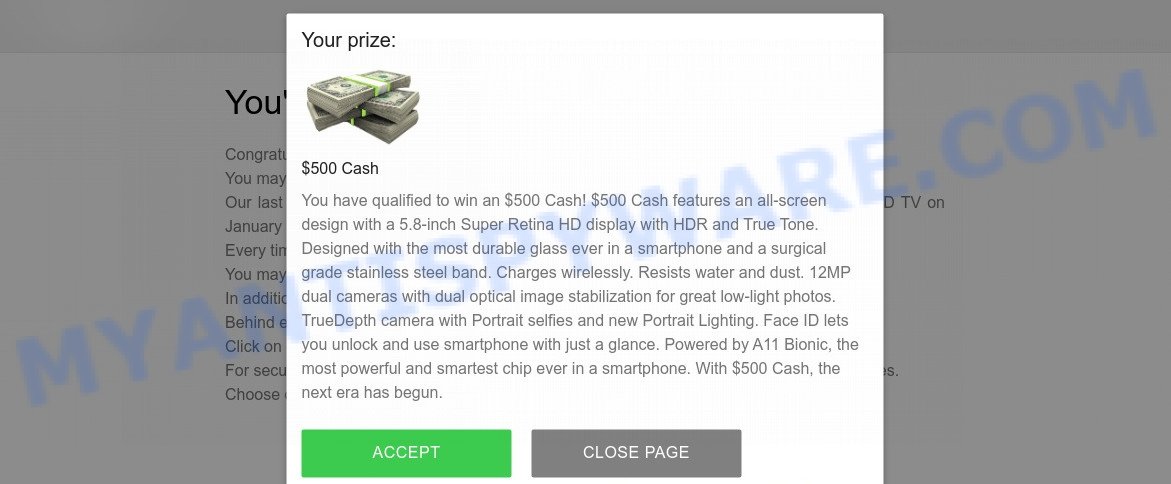Beware of the “Google 5 Billionth Search” Pop-Up Scam. If you’ve recently encountered a pop-up claiming that you’ve made the “5-billionth search” on Google and won a prize, be very cautious. This message is a classic scam designed to trick you into clicking on suspicious links or providing personal information.
The scam typically congratulates you as a “lucky winner” of high-value prizes, such as the latest Samsung Ultra HD TV, and urges you to select one of several hidden prizes quickly, claiming the offer expires in just 15 minutes. It even tries to sound legitimate by naming fake previous winners with specific dates and locations.

In reality, this pop-up is nothing more than a deceptive lure. It does not come from Google or any reputable company—Google itself does not run prize contests through such pop-ups or ask you to click boxes to claim prizes. The whole setup is intended to steal your data or install malware on your device.
If you see this message, do not engage with it or click any links. Close the browser tab immediately, and run a scan with trusted antivirus software if you suspect your system might be compromised. Remember, real giveaways do not pressure you with ticking timers or hidden boxes—always verify offers through official channels.
Table of Contents
🚨 Is the “Google 5 Billionth Search” Pop-Up a Scam?
The “Google 5 Billionth Search” pop-up is a classic scam designed to trick unsuspecting users into believing they have won a prize by performing a certain number of searches. This fraudulent message uses fake claims, time pressure, and enticing rewards to lure victims into clicking suspicious links or providing personal information.
Key Red Flags:
- 🌐 Fake Promotion: The claim that you are the “5-billionth search” is entirely fabricated. Google does not run such contests or display pop-ups like this.
- ⚠️ Pressure Tactics: The pop-up pressures users to act quickly by giving a limited time (e.g., 15 minutes) to claim their prize, a common technique to rush decisions without proper consideration.
- 🎁 Suspicious “Prizes”: The boxes you are asked to click are part of the scam’s method to engage users and lead them to further scams, malware, or attempts to collect personal data.
- 🕵️♂️ No Verification: The named previous “winner” and the detailed counterfeit story are fabricated to create a false sense of trust and legitimacy.
- 🔗 Redirects and Data Collection: Clicking on the prizes often leads to fraudulent websites that may ask for sensitive information or prompt downloads of malicious software.
- 🚫 No Official Google Branding: Genuine Google messages include proper branding and are shown only within Google’s platforms, not as unsolicited pop-ups on third-party sites or browsers.
In summary, the “Google 5 Billionth Search” pop-up is a scam. It uses deceptive tactics to entice users with fake prizes and urgency to capture personal information or infect devices with malware. Users should avoid interacting with this pop-up and close such messages immediately. For authentic Google offers or promotions, visit official Google channels and websites only.
🕵️♂️ How the Google 5 Billionth Search Pop-Up Scam Operates
Scammers behind the Google 5 Billionth Search pop-up start by triggering intrusive ads and fake notifications on various websites and through malicious redirects. These pop-ups claim that you’ve made the “5-billionth search” and that you’re the lucky winner of a valuable prize, such as an Ultra HD TV or other electronics, designed to entice curiosity and excitement. The message is often personalized with fake winner names and dates to create an illusion of legitimacy.
When users engage with the pop-up by clicking on one of the “hidden prize” boxes, they’re led to dubious sites where they’re asked to complete surveys, enter personal information, or even provide payment details to claim their prize. These sites use persuasive language and countdown timers claiming “technical reasons” to pressure you into making quick decisions without proper consideration.
The pop-ups also use fake “Hall of Fame” mentions and winner certificates to blackmail trust, suggesting that recipients are part of an exclusive group of winners. However, no actual prize is ever delivered. Instead, users may fall prey to identity theft, spam, or unauthorized charges on their accounts.
The scam’s website designs mimic legitimate pages but often contain poor grammar, awkward phrasing, and inconsistent branding. Additionally, they may install malware or unwanted software via hidden downloads during the interaction.
No reputable organization affiliated with Google or any search engine promotes such giveaways through these pop-ups, and genuine contests never require users to pay fees or provide sensitive personal data upfront.
In summary, the Google 5 Billionth Search pop-up scam exploits false claims of instant prizes and urgency tactics to deceive users into sharing personal information and money. It leaves victims vulnerable to fraud, financial loss, and compromised privacy. Always be suspicious of unsolicited prize claims and verify offers through official channels before taking any action.
😱 What to Do If Scammed
If you find yourself ensnared by the Google 5 Billionth Search Scam, immediate action is crucial. Here’s what you should consider doing:
🛑 Stop Further Transactions
The first step is to halt any additional transactions that might be in process. Contact your bank or credit card provider and inform them that you’ve fallen victim to a scam. They can help by blocking the card or reversing any unauthorized transactions.
📞 Report the Fraud
File a report with your local police and provide all the available evidence, such as screenshots, emails, and website URLs. Additionally, report the scam to online portals like the Better Business Bureau (BBB) at www.bbb.org or the Federal Trade Commission (FTC) at reportfraud.ftc.gov. If you’re in another country, reach out to your national consumer protection agency.
💻 Take Screenshots
Before the scam website gets taken down or changes, make sure to capture screenshots of your transactions and communications. These can serve as evidence if you decide to pursue legal action.
⚖️ Consult Legal Advice
Speak to a legal advisor about your situation. While pursuing legal action may be time-consuming and costly, it could be a possible avenue for recovering your lost money.
📢 Share Your Experience
Use social media platforms to share your experience and warn others about the scam. Your story could prevent someone else from falling victim to the same or similar scams.
Summary Table
| Factor | Observations | Impact on Legitimacy |
|---|---|---|
| Popup Message | The message claims that the user has made the 5-billionth Google search and has won a prize, offering a choice among hidden rewards and entering them into a Hall of Fame. It creates a sense of urgency by limiting the time to claim the prize to 15 minutes. | Negative (Fake prize offer with urgent call to action) |
| Prize Claims | The popup mentions previous winners and high-value prizes such as a Samsung Ultra HD TV, but there is no official confirmation or connection to Google for such giveaways. | Negative (False claims about prizes and winners) |
| Source Legitimacy | The popup appears randomly while browsing and is not issued by Google or credible sources. The type of message and offer is typical of scam or phishing attempts trying to trick users. | Negative (Unauthorized and misleading popup scam) |
| User Interaction | Users are encouraged to click on boxes to uncover prizes, which can lead to malicious websites or fraudulent data collection attempts, risking privacy and security. | Negative (Potential for malware infection or personal data theft) |
| Urgency and Pressure | The popup enforces a 15-minute limit to claim prizes, pushing users to act quickly without thinking or verifying the offer. | Negative (Manipulative pressure tactic to rush users) |
| Technical Details | The message mentions “technical reasons” to explain the time limit, which is a vague excuse designed to increase urgency rather than inform. | Negative (Unclear and misleading justification for urgency) |
| Overall Trustworthiness | No evidence links this popup to Google or any legitimate company. It mirrors common internet scams that falsely promise prizes to collect personal information or spread malware. | Negative (Completely untrustworthy and deceptive) |
Conclusion
The Google 5 Billionth Search Pop-Up is a scam, designed to trick users with false claims of winning prizes like Samsung Ultra HD TVs and entry into a “Hall of Fame”. This deceptive popup uses fabricated stories, such as a made-up winner named Brad Jenkins, to create a false sense of legitimacy and urgency, pressuring you to select a prize quickly.
Instead of delivering genuine rewards, this scam attempts to harvest personal information or prompt users to engage with suspicious links. The message’s insistence on a 15-minute time limit is a classic tactic to rush users into making hasty decisions without verifying the authenticity.
Bottom Line: Avoid interacting with the Google 5 Billionth Search Pop-Up. Legitimate contests do not display on random pop-ups or require immediate action under strict time limits. Always be skeptical of unsolicited “you’ve won” messages, especially those with unrealistic prizes and urgent calls to action. Protect your personal data by closing such pop-ups and not sharing any information.














I got the Google Online Winner notice, today.
Here is the URL for the Myantispywareteam.com, today.
hxxps://free.modanova.shop/dailynews.php?key=80cdb2fe2067fd74824a&siteId=untracked&domain=untracked&exchange=outbrain-mmm-dsp-pc-eoicd-appnexus-first-key-in-url-aiuchdpmjer&dd=webmailb.juno.com&ao=%7B%220%22%3A%22https%3A%2F%2Fwebmailb.juno.com%22%2C%221%22%3A%22https%3A%2F%2Fwebmailb.juno.com%22%7D&hardware=%5Bcpu%5DWin32%5B-%5D16%20Cores%5Bgpu%5DGoogle%20Inc.%20(NVIDIA)%5B-%5DANGLE%20(NVIDIA%2C%20NVIDIA%20GeForce%20GTX%201660%20Ti%20(0x00002182)%20Direct3D11%20vs_5_0%20ps_5_0%2C%20D3D11)&timezone=America%2FNew_York&screen=1920-1080&info=binom&redirect=topRedirect
Hope this is helpful.
yes, thank you